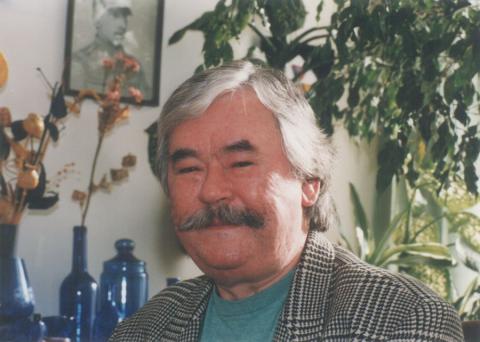Csukás István: Biography
István Csukás (Kisújszállás, 2 April 1936 – Budapest, 24 February 2020)
Kossuth and two-time József Attila Prize-winning poet, writer, youth author, honoured with the title of Artist of the Nation. He was a member of the Digital Literature Academy from 2000 until his death.
*
Born in Kisújszállás on 2 April 1936. Based on their facial features, he thought his mother, Margit Varró, was of Cuman (kun) origin, and his father of Jászic origin. His father was a master blacksmith in Kisújszállás who had a difficult life, working in a shared porter’s shop with a friend who was a wheel maker. He had big dreams and plans; first he bought the whole yard for the workshop, then he bought a tractor and threshing machine. It was in this poor but happy world the poet spent his childhood and went to elementary school.
His life changed dramatically after the war: encouraged by a music teacher, he enrolled at a newly established music school according to his mother’s wishes with the goal of becoming a violinist. It was also an escape for him, because the family had become very poor, his father had been deprived of his forge, and the family earned their living in large building projects. His younger brother became an apprentice in the industry. The institute was the second happy period of the young student’s life: he studied, read, and practised all day long in the castle and the expansive park, played chamber music, gave recitals, and ambitiously prepared for a career as a violinist. In the summers he worked alongside his father on building sites, carrying bricks and desperately soaking and nursing his ruined fingers. He rebelled against his father, then against the institute, and finally against music. After graduating, he first applied to law school, and after a while he went on to the liberal arts. He attended university between 1954 and 1957.
He also rebelled against the university and did not finish his liberal arts studies. He published his first poems, wrote and worked as a literary assistant, was head of the Young Artists’ Club, then worked for the Art Fund, the Ministry of Labour and the Néphadsereg (People’s Army) newspaper. From 1968 to 1971 he worked for Hungarian Television, and from 1978 to 1985 he was editor-in-chief of the Móra Ferenc Publishing House. From 1989 to 1991, he was a member of the editorial board of Új Idő.
He was active in youth literature not only in publishing but also in editing children’s magazines. He was the founding editor of Kincskereső (Treasure Hunter). For a time he was chairman of the editorial board of the magazine Kölyökmagazin, and later editor-in-chief of Piros pont (Fine Selection).
During these brief periods he was also a freelance writer.
He married his wife, Maria Porga, in 1975.
In his early poetry, he wrote about a young intellectual finding himself and his place in the big city, with painful nostalgia for a vanished childhood and a youth in the process of disappearing. The defining feature of his later poems is a hymnic love of life; he takes possession of the common values and happiness of body and spirit with a healthy sense and instinct. Songs of a different tune about this love of life are poems wrestling with passing, poetic responses to the warnings of death. The strong musicality of his earlier poems gets replaced by a mellower melody and a more ironic, superior poetic approach to piety.
In the mid-1960s, he turned to children’s literature, and from then on, in addition to his poetry collections, other works like children’s novels, storybooks and verse tales appeared in increasing numbers. His play Ágacska (Little Twig), and later his other stage works, were a great success. In 1975, at the Hollywood Television Festival, the feature film Keménykalap és krumpliorr (Hard Hat and Potato Nose) was awarded the Grand Prize and Best Children’s Film of the Year.
He died following a serious illness in Budapest on 24 February 2020.
The biography was written by László Farkas, translated by Benedek Totth and Austin Wagner.

 (Fotó: Borsos Mihály)
(Fotó: Borsos Mihály)